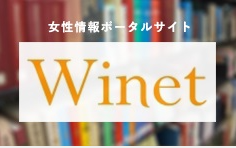Cooperation with JICA
- HOME
- International Cooperation
- Cooperation with JICA
- FY2024 Knowledge Co-Creation Program "Eradicating Sexual and Gender-Based Violence (SGBV)"
Cooperation with JICA
- Event Report
-
FY2024 Knowledge Co-Creation Program "Eradicating Sexual and Gender-Based Violence (SGBV)"
Date:September 3(Tue) to October 12(Sat), 2024
The National Women’s Education Center (NWEC) held a Knowledge Co-Creation Program (KCCP) course entitled “Eradicating Sexual and Gender-Based Violence (SGBV)” from September 3 to October 12, 2024, commissioned by the Japan International Cooperation Agency (JICA).
There were 14 participants representing governments and an NGO who are engaged in SGBV countermeasures in the following countries: People's Republic of Bangladesh, Botswana, Democratic Republic of Congo, Federal Democratic Republic of Ethiopia, Kenya, Maldives, Mongolia, Nepal, Islamic Republic of Pakistan, Papua New Guinea, Solomon Islands, South Sudan, Democratic Socialist Republic of Sri Lanka, and Democratic Republic of Timor-Leste.
The seminar was a combination of an online orientation session and on-demand self-study prior to the visit to Japan and a face-to-face program in Japan for approximately 3 weeks. Through lectures on SGBV countermeasures and visits to relevant facilities in both government and private sectors, the participants deepened the understanding of support services based on the international standard of victim/survivor-centered approach, measures and action plans for eradicating SGBV in each country, including Japan. At the end of the program, each participant drafted an action plan on how to strengthen the measures for eradicating SGBV in their own work capacities and presented it at the final session.
1. Online program before coming to Japan
Online orientation sessions were held on September 3 and 5 where each participant presented their Inception Report summarizing an overview of their organizations, respective duties, and challenges in addressing SGBV.
Through on-demand videos, participants learned how the issues of SGBV are addressed worldwide and in Japan (Videos include efforts by JICA and the Global Network of Women's Shelters (GNWS), the media cooperative Unfiltered in addressing the difficulties faced by elderly women, the GBV project implemented by JOICFP in Zambia, and the support project for young women by the non-profit organization BOND Project).
2. In Japan Program
■ September 24 (Tue) to 30 (Mon)
Program orientation on the first day was followed by a keynote lecture on international trends of SGBV, lectures from the Cabinet Office, the Ministry of Education, Culture, Sports, Science and Technology (MEXT), the National Police Agency (NPA), and local governments highlighted current situation and the efforts by the Japanese governments. In addition, various perspectives of SGBV issues including the outreach activities by NPOs were presented.
In the keynote lecture, Mikiko Otani, attorney lawyer and an expert member of Committee on the Rights of the Child (CRC) highlighted the framework of the Convention on the Elimination of All Forms of Discrimination against Women (CEDAW) and its Protocol, as well as regional treaties such as the Council of Europe convention on preventing and combating violence against women and domestic violence (the Istanbul Convention). It was pointed out that there is no such regional framework in the Asia. Participants discussed what can the international community do to address the problem of SGBV that is made clear by conflicts and disasters, including the situation in Afghanistan where women's education and employment opportunities are severely restricted.
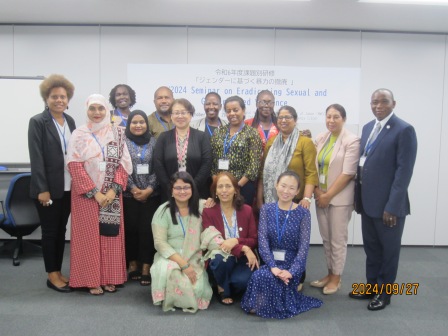 Group photo with the keynote lecturer
Group photo with the keynote lecturer
As initiatives of the Government of Japan, the Cabinet Office introduced measures to promote gender equality, the NPA introduced police initiatives to combat stalking and domestic violence to protect victims, and the MEXT explained "Life Safety Education" and "Prevention of Sexual Violence against children by Education Personnel". Some countries have legislated comprehensive law on stalking and domestic violence some have not yet addressed the issues of stalking. Measures against sexual assault against children in educational settings and in communities are a major issue across the countries. There was a lively exchange of views on the efforts of the MEXT and Board of Education.
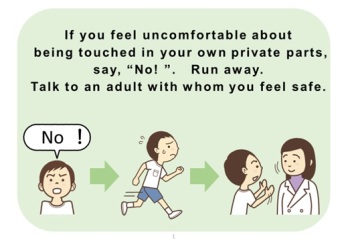 Excerpts from slides on Life Safety Education
Excerpts from slides on Life Safety Education
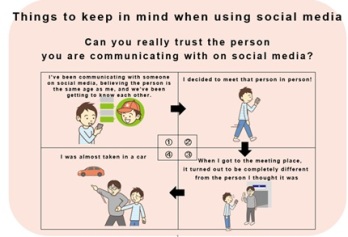
Director of Tokyo Women's Consultation and Support Center explained the role of the Spousal Violence Counseling and Support Centers and the temporary protection of women with difficulties, including domestic violence victims.
Associate Professor Haruko Kudo of Kobe University held a workshop on "Protection from Sexual Exploitation and Abuse (PSEA)," which is practiced in the field of international cooperation and assistance. The participants acknowledged the needs of ensuring the organizational management and creation of an environment based on a victim/survivor centered approach.
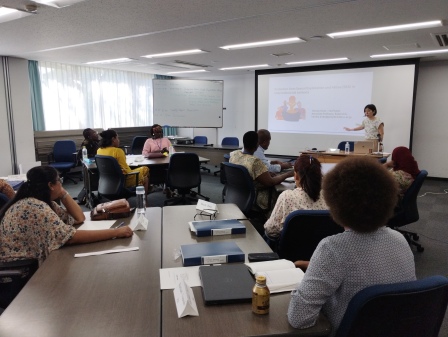 Workshop on "Protection from Sexual Exploitation and Abuse (PSEA)
Workshop on "Protection from Sexual Exploitation and Abuse (PSEA)
From Non-Profit Organization BOND Project, Jun Tachibana, the representative of the NPO and the staff talked about their activities focusing on outreach to young women who face difficulties but is not able to connect to the support from public organizations. The participants were very impressed with the resilience of the survivor and commended BOND Project’s support to empower such young women.
■ October 1 (Tue) to 3 (Thu)
This year, the participants visited Hyogo Prefecture for three days.
During the visit to the Hyogo Prefectural Gender Equality Center; “EVEN”, the Director of Even explained the efforts of training and counseling services to promote gender equality. On the facility tour, the participants were highly interested in the information center, which houses books and DVDs on various fields related to gender and gender equality, such as disaster, career building, child rearing and health etc. Many participants expressed the lack of gender related information for women in their country and expressed interest to build such resource center in their countries. The Director of the Hyogo Prefectural Woman & Family Consulting Center came to EVEN to present their role and activities such as providing temporary protection and counseling support. The participants asked many questions about mental support, counseling, and support systems.
Presentation by Non-Profit Organization Regional Center for Sexual Assault and Abuse Victim Hyogo at the Hyogo Prefectural Amagasaki General Medical Center deepened participants’ understanding of the importance of providing one-stop center where support is provided by medical professionals and NPO staff who have extensive knowledge and experience in sexual violence. It contributes to reducing the burden on victims and leads to the prosecution of perpetrators. The participants were also impressed by the hospital's systematic approach to victim support.
Visit were made to Rokko Women’s House and WACCA run by Non-Profit Organization Women's and Children's Support Center, Women's Net KOBE. These places are for women, single mothers and children. Reiko Masai, president of the organization gave an inspiring presentation about medium- and long-term support focused on providing housing where women can live with peace of mind, and receive learning support as well as providing a space for single mothers raising children.
From the 3 days visit to Kobe, the participants learned a great deal from the power and efforts of people, governments, women's organizations, and others who have made a recovery and reconstruction from the great Hanshin Awaji earthquake in 1995.
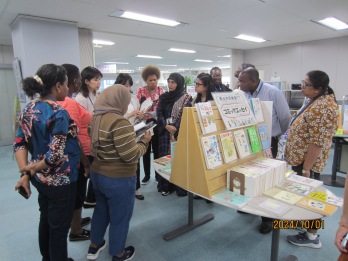 Information Center at Hyogo Prefectural Gender Equality Center; EVEN
Information Center at Hyogo Prefectural Gender Equality Center; EVEN
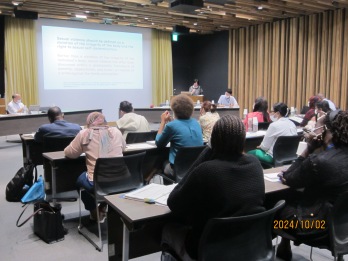 Lecture by the Non-Profit Organization Regional Center for Sexual Assault and Abuse Victim Hyogo at the Hyogo Prefectural Amagasaki General Medical Center
Lecture by the Non-Profit Organization Regional Center for Sexual Assault and Abuse Victim Hyogo at the Hyogo Prefectural Amagasaki General Medical Center
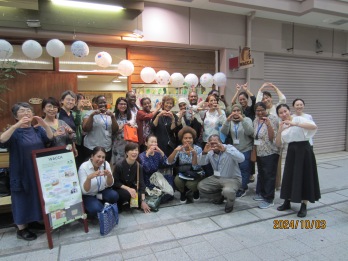 Visit to WACCA; a place for women, single mothers and Children
Visit to WACCA; a place for women, single mothers and Children
■ October 4 (Fri) ,7(Mon) to 8 (Tue)
Lectures and site visits were conducted to hotlines and SNS consultations, advocacy activities for supporting victims of SGBV and digital sexual exploitation.
Staffs at the General Incorporated Association, Social Inclusion Support Center (Yorisoi Hotline) explained the special characteristics of their hotline which conducts accompaniment support until the clients can manage themselves. Yorisoi Hotline provides multiple language support by many native speakers. Some participants expressed the desire to increase the number of language services in their own countries.
Kazuko Ito, an attorney at Law and Vice President of Non-Profit Organization Human Rights Now, an international human rights NGO, presented the current situation and challenges of violence in online spaces from a legal perspective. Then, Non-Profit Organization PAPS, talked about their support services for victims of digital sexual exploitation and useful websites to take down sexual images online. The participants shared the current situation that needs to be addressed in their own countries, such as child pornography through grooming and digital exploitation.
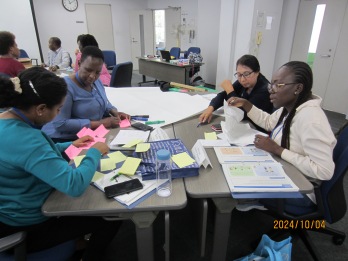 Participants sharing key takeaways from lectures and visits in a small group
Participants sharing key takeaways from lectures and visits in a small group
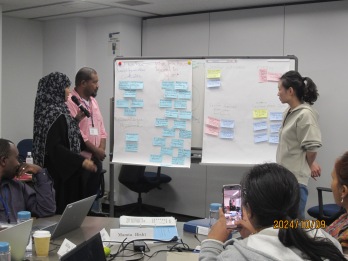 Presenting the sharing within the groups to the whole participants
Presenting the sharing within the groups to the whole participants
■ October 9 (Wed) to 11 (Fri)
The last three days included lecture on the Perpetrator Program by Akiyoshi Saito, Deputy Director of the Nishikawaguchi Enomoto Clinic, and participants' preparation of their action plans.
Each participant presented an individual action plan for tackling SGBV issues in their country. Action plans included such topics as strengthening functions and infrastructure of GBV one stop center, improving data management and monitoring for evidence-based policy making, as well as promoting effective awareness raising and training on GBV issues, support services and referrals and implementation of perpetrators’ rehabilitation by underlining survivor centered approach.
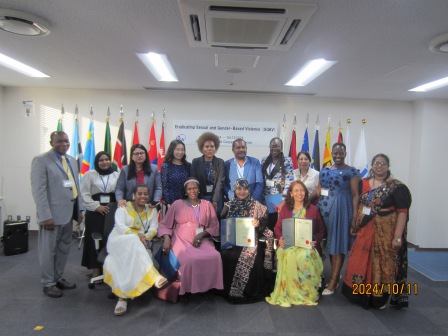 At the closing ceremony on the last day, each participant received a certificate of completion from JICA.
At the closing ceremony on the last day, each participant received a certificate of completion from JICA.
3. At the end
NWEC sincerely thanks all the individuals of the relevant ministries and agencies (the Cabinet Office, Ministry of Education, Culture, Sports, Science and Technology and the National Police Agency), local governments (Tokyo and Hyogo), international organizations, private-sector support groups, experts, and networks engaged in support activities, who offered a great deal of cooperation in giving lectures, opinion exchanges, and visits for carrying out this seminar.
International Cooperation
- International Seminar
- FY2019 Seminar for Gender Equality Officers and Women Leaders in the Asia Region
- FY2018 Seminar for Gender Equality Officers and Women Leaders in the Asia Region
- FY2017 Seminar for Gender Equality Officers and Women Leaders in the Asia Region
- FY2016 Seminar for Gender Equality Officers and Women Leaders in the Asia Region
- FY2015 Seminar for Gender Equality Officers and Women Leaders in the Asia Pacific Region
- FY2014 Seminar for Gender Equality Officers and Women Leaders in the Asia Pacific Region
- FY2013 Seminar for Gender Equality Officers and Women Leaders in the Asia Pacific Region
- FY2012 Seminar for Gender Equality Officers and Women Leaders in the Asia Pacific Region
- FY2011 Seminar for Gender Equality Officer and Women Leaders in the Asia Pacific Region
- FY2010 Empowerment Seminar for Women Leaders in the Asia Pacific Region
- FY2009 Empowerment Seminar for Women Leaders in the Asia Pacific Region Final Report
- FY2008 Empowerment Seminar for Women Leaders in the Asia Pacific Region
- FY2007 Empowerment Seminar for Women Leaders in the Asia Pacific Region
- FY2006 Empowerment Seminar for Women Leaders in the Asia Pacific Region
- NWEC Global Seminar
- FY2025 NWEC Global Seminar: Addressing Technology-Facilitated Gender Based Violence (TFGBV): Approaches to Eradicate the Invisible Harm
- FY2024 NWEC Global Seminar: Gender Equality and Care
- FY2023 NWEC Global Seminar: Gender Mainstreaming & Strengthening Institutional Mechanism with Gender Perspective
- FY2022 NWEC Global Seminar: Does Digital Technology Advance Gender Equality?
- FY2021 NWEC Global Seminar: Combating Gender-Based Violence – “Building Back Better” from the Covid-19 Crisis
- FY2020 NWEC Global Seminar: Covid-19 and Gender
- FY2019 NWEC Global Seminar: Gender and Media
- FY2018 NWEC Global Seminar: Promotion of the Advancement of Women - What Japan can learn from Iceland about Gender Equality?
- FY2017 NWEC Global Seminar: Promotion for Advancement of Women Lessons from Germany
- FY2016 NWEC Global Seminar: Promotion for Advancement of Women –Lessons from Europe
- FY2015 International Symposium: Gender Equality and Women's Empowerment
- FY2014 International Symposium: Keys to Diversity and Women's Leadership
- FY2013 NWEC International Symposium:Gender Equality for Men
- FY2012 NWEC International Symposium:To Make a Society without Violence against Women a Reality
- FY2011 NWEC International Symposium
- FY2010 International Forum for Women's Empowerment
- FY2009 International Forum for Women's Empowerment
- FY2008 International Forum for Women's Empowerment Final Report3
- FY2008 International Forum for Women's Empowerment Final Report2
- FY2008 International Forum for Women's Empowerment Final Report1
- Cooperation with JICA
- FY2025 Knowledge Co-Creation Program (KCCP): "Promotion of Global Networking on Anti-Trafficking in Persons"
- FY2025 Knowledge Co-Creation Program "Eradicating Sexual and Gender-Based Violence (SGBV)"
- FY2025 Knowledge Co-Creation Program: Bangladesh “Strengthening Capacity to Address Gender-Based Violence"
- FY2024 Knowledge Co-Creation Program on "Promotion of Global Networking on Anti-Trafficking in Persons"
- FY2024 Knowledge Co-Creation Program "Eradicating Sexual and Gender-Based Violence (SGBV)"
- FY2023 Knowledge Co-creation Program "Promotion of Networking among ASEAN Countries on Anti-Trafficking in Persons”
- FY2023 Knowledge Co-Creation Program "Eradicating Sexual and Gender-Based Violence (SGBV)"
- FY2022 Knowledge Co-creation Program "Promotion of Networking among ASEAN Countries on Anti-Trafficking in Persons”
- FY2022 Knowledge Co-Creation Program "Eradicating Sexual and Gender-Based Violence (SGBV)"
- FY2021 Knowledge Co-creation Program "Promotion of Networking among ASEAN Countries on Anti-Trafficking in Persons”
- FY2020 Knowledge Co-creation Program "Promotion of Networking among ASEAN Countries on Anti-Trafficking in Persons”
- FY2019 Knowledge Co-creation Program "Promotion of Networking among ASEAN Countries on Anti-Trafficking in Persons”
- FY2018 Knowledge Co-creation Program "Promotion of Networking among ASEAN Countries on Anti-Trafficking in Persons”
- Issue-specific Training “Seminar on Promotiom of Networking among ASEAN Countries on Anti-Trafficking in Persons”
- Basic Information-Gathering Survey/Workshop Seminar on the Economic Independence for Women in Central America and the Caribbean (El Salvador/Dominican Republic)
- Regional Gender Seminar in Central and South America
- 2015 Issue-specific Training "Seminar on Promotion of Networking among Asian Countries on Anti-Trafficking in Persons"
- Seminar on the Promotion of Education for Girls and Women II
- International Conference/International Exchange
- Online meeting with Seisen International School elementary students
- Visitor: Mansfield Fellows
- Visitor:JICA Knowledge Co-Creation Program (KCCP) on "Women's Empowerment through Business for Central American Integration System (SICA) Member Countries"
- The 68th Session of the Commission on the Status of Women
- Visitor: Madam Sustjie Mbumba, First Lady of the Republic of Namibia
- Workshop of commemorating the donation of the Beate Shirota Gordon archive materials
- Meeting with Korean Women’s Development Institute (KWDI)
- The Coalition of Finnish Women's Associations (NYTKIS) Secretary General Ms. KAKKOLA’s Courtesy Call to Foreign Minister KAMIKAWA
- The Coalition of Finnish Women's Associations (NYTKIS) Secretary General Ms. KAKKOLA’s Japan Visit Program
- The 67th Session of the Commission on the Status of Women
- NGO CSW67 Forum
- Webinar with Korean Women’s Development Institute (KWDI)
- The 66th Session of the Commission on the Status of Women (Hybrid format)
- Online meeting with international graduate students from the Appropriate Technology course at the University of Tsukuba
- The 65th session of the Commission on the Status of Women
- Lecture "The Beate Sirota Gordon Archives at Mills College"
- Participation in 2nd AGenT
- The 64th session of the Commission on the Status of Women
- Dr. Wang from National Taiwan University visits NWEC
- Japan Network of Women Engineers and Scientists and The Japan Inter-Society Liaison Association Committee for Promoting Equal Participation of Men and Women in Science and Engineering: 9th Japan Korea China Women Leaders Forum for Science & Technology
- Researcher from the KWDI visits NWEC
- Visit by a delegation from the Socialist Republic of Vietnam Ministry of National Defense
- Briefing on the Reykjavik Index for Leadership
- Women's Archives Center Exhibition "Beate Sirota Gordon and gender equality in Japanese Constitution"
- Visit from the Guangxi Women’s Federation
- Participation in the 63rd Session of the Commission on the Status of Women
- 7th Global Forum on Gender Statistics
- FY2018 International Symposium hosted by Korean Institute for Gender Equality Promotion and Education “Gender Equality at Schools”
- Visit from All-China Women’s Federation(ACWF)
- Participation in the 62nd Session of the Commission on the Status of Women
- The 14th KIGEPE International Symposium “Empowering Women’s Leadership: expanding influence and innovation”
- Participation in the 61st Session of the Commission on the Status of Women
- Visit from the Batis Center for Women
- 2011 Asia Women Eco-Science Forum (a forum of science and engineering leaders in Japan, China and Korea)
- The 60th Session of the Commission on the Status of Women
- The 59th Session of the United Nations Commission on the Status of Women
- The 58th Commission on the Status of Women
- The 57th Session of the United Nations Commission on the Status of Women
- International Symposium: Gender Awareness Education for Sustainable Development
- Thirtieth Anniversary Programs
- Attendance at the Ceremony Commemorating the 25th Anniversary of the Korean Women’s Development Institute (KWDI)
- Japanese-Filipino children (JFC)* from the Philippines-based NGO “DAWN” visit the Center
- Visitors from Abroad to NWEC
- Research report on Multicultural Family Support in South Korea
- Workshop on Gender and Education: Life-long Learning for Women’s Empowerment
- Lecture Delivered by a Visiting Researcher
- Connections: Bringing Together the Next Generation of Women Leaders in Science, Technology, Engineering and Mathematics
- Conclusion of Memorandum of Understanding on Exchange and Cooperation with the Ministry of Women's Affairs, Royal Government of Cambodia
- Visit to Japan by the Minister of Women’s Affairs of the Royal Government of Cambodia
- KIGEPE Delegation Visit
- Officials of Ministry of Information and Communications of the Socialist Republic of Vietnam visited NWEC
- The 56th Commission on the Status of Women
- Dr. Barker's visit
- Multidisciplinary Intellectual Exchange for Women Leaders from the United States, Japan, South Korea and the Philippines
- Courtesy visit to University of Hawai`i
- Delegation of Board for the Advancement of Women, Ministry of Finance of the Socialist Republic of Vietnam visited NWEC
- Visit Korean Women's Development Institute (KWDI)
- Report on Participation in the 5th World Social Forum on Migration
- A group led by the Vice President of the Korean Women's Development Institute visited NWEC
- A disaster management specialist from India visits the Center
- Visit to the Korean Institute for Gender Equality Promotion & Education (KIGEPE) and others
- Secretary of State, Ministry of Justice, Kingdom of Cambodia visited NWEC
- Research conducted in the Republic of the Philippines
- Research on the Comparative Study of the Gender Equality Policy in Southeast Asian Countries in the Kingdom of Cambodia
- Ochanomizu University and A Canadian Women’s Study Researcher visited NWEC
- Aigyung Yang, Research Fellow and Former Director of Strategy Board for Women Friendly Policies of the Korean Women's Development Institute (KWDI) Visits NWEC
- Delegation of the Ministry of Defense of the Socialist Republic of Vietnam visited NWEC
- Delegation from the Women and Development Center, of the Vietnam Women's Union, Visited NWEC
- The "7th Asia-Pacific Forum on Development and Gender" was held in Seoul, South Korea
- HOME
- International Cooperation
- Cooperation with JICA
- Cooperation with JICA
- FY2024 Knowledge Co-Creation Program "Eradicating Sexual and Gender-Based Violence (SGBV)"

